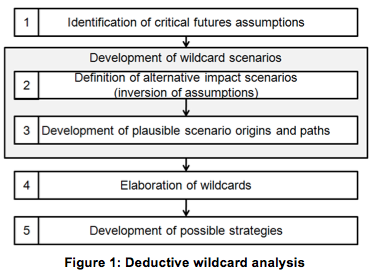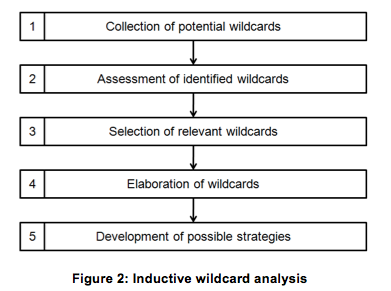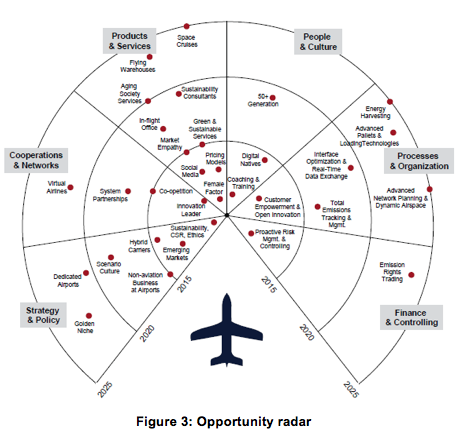Our study intends to present disruptive and challenging events, i.e. wildcard scenarios, with a significant impact on the aviation industry. We aim to assist decision and policy makers in preparing for the future and enrich decision making processes on possible courses of action by presenting a robust and reliable decision support system and creating awareness for opportunities in strategy and policy. We demonstrate how a Delphi survey (in our case a real-time variant) can be applied as a starting point to systematically develop wildcard scenarios by conducting a deductive wildcard analysis.
Combining Delphi with a Wild Card Approach
In an increasingly uncertain environment, planning uncertainties force policy and decision makers to foster strategic forecasting and technology planning processes, including future-oriented technology analyses (FTA). In spite of its growing importance, the recent expansion of FTA has paid little attention to conceptual development, research on improved methods, methodological choice or how best to merge empirical/analytical methods with stakeholder engagement processes. This is especially the case for Delphi surveys, which are one of the most commonly used tools in FTA. We address this issue by demonstrating how an innovative web-based real-time Delphi can ensure validity and reliability of foresight activities via taking relevant drivers of change into account, such as technology, socio-culture, politics, the economy and the environment. Our highly standardised scenario development process applies qualitative as well as quantitative measures and equips policy and decision makers with a robust and reliable decision support system.
We outline specifically how the Delphi method can be used to identify wildcard developments deductively and at an early point in time (Däneke, von der Gracht et al. 2010) while we also illustrate inductive wildcard analysis.
Furthermore, the results of our study and adjacent analyses allow to derive an ‘opportunity radar’, which depicts a range of opportunities and challenges for governments and companies (von der Gracht, Gnatzy et al. 2010). Our ‘radar’ is the product of several participatory future workshops in which the examined scenarios were discussed. It is designed to provide a pragmatic but also creative perspective on the future while displaying opportunities with different degrees of innovativeness.
Innovative Real-time Delphi
The study employs an innovative version of the Delphi method (von der Gracht, Gnatzy et al. 2011) and is designed as an Internet-based, almost real-time survey, which increases the validity of results by streamlining the classical procedure. Our Delphi method combines quantitative as well as qualitative research approaches to ensure a high level of scientific rigour and thus refutes objections raised in the past on grounds of expert panel biases or time scale disadvantages (EC 2004).
Furthermore, we have introduced methodological and usability improvements so that Delphi remains a valuable tool for FTA procedures. Such improvements are the ‘ease-of-use facilitator portal’, the ‘consensus portal’ and a ‘graphical real-time feedback’, which reduce drop-out rates and speed up the whole process.
Delphi Data Sample and Analysis
Within the scope of our Delphi survey (Linz and Rothkopf 2010), 57 aviation strategists, C-level executives, aviation researchers and consultants evaluated 40 projections in terms of probability (scale from 0-100%) and desirability of occurrence (5-point Likert scale) as well as impact on the aviation industry (5-point Likert scale).
In addition to their quantitative assessments, participating panellists were able to provide qualitative statements to support their numerical estimations and discuss relationships between factors thought to shape future developments. Based on the assessments and more than 1,300 collected verbal arguments offered in support of the individual expert expectations, relevant extreme and wildcard scenarios were deducted, enabling contingency planning and preparation for unforeseeable and disruptive events (Cuhls and Johnston 2006). Furthermore, the arguments and comments provided the foundation for later storytelling and the identification of weak signals, wildcards, outlier opinions and mainstream arguments.
Delphi-based Deductive Wildcard Analysis
The deductive wildcard analysis aimed at developing and analysing company and market-specific wildcards. Since the kind of data required for such an analysis is generally not readily available, the wildcards have to be developed from scratch. Due to the complexity of the future and the unpredictability associated with complexity, the number of potential surprises is virtually endless. Therefore, it is impossible to identify all possible wildcards in an exhaustive manner. Nevertheless, the deductive wildcard analysis provides an adequate approach for identifying those issues relevant to a specific company at a reasonable cost.

In the first step, the critical future assumptions have to be identified. In a second step, wildcard scenarios are deducted on the basis of a qualitative Delphi data analysis and scenario techniques. This is followed by the development of plausible scenario origins and paths. Fourth, relevant wildcards have to be elaborated. And finally, possible strategies and policies need to be developed in order to enable linkage between strategy and daily business requirements. The wildcard transfer has to be conducted through a process of storytelling, contingency planning and the set up of an early warning system.
Inductive Wildcard Analysis
The inductive wildcard analysis is based on the idea of manifold archetypical wildcards that generally have to be taken into account by policy makers and business leaders. Those wildcards can represent internal (e.g., financial failure) or external disruptive events (e.g., natural disaster). The wildcard analysis consists of five incremental steps.

First, potential wildcards have to be collected. Second, the wildcards identified need to be assessed in terms of relevance to politics and business. In a third step, relevant wildcards must be selected. The wildcards thus selected are then elaborated with regard to their operative and strategic implications. Finally, possible strategies and policies are developed and implemented.
The Future of Aviation between Terrorist Threats and New Fuel Technologies
Based on the survey data, we derived several wildcard scenarios for the year 2025, which address manifold aspects ranging from natural catastrophes to technological revolutions (Linz and Rothkopf 2010).
(1) Aviation Terrorism Reloaded
Since 9/11, the fear of terrorist attacks has increased tremendously. Important hubs and large airports especially could become the focus of physical aggression.
(2) Spread of a Global Pandemic
New pathogens originate worldwide on a regular basis. The potential impact of a prolonged global pandemic on aviation networks has become apparent in the case of SARS in Asia in 2002/2003.
(3) Natural Catastrophes
Major impacts can evolve from volcanic activities as in 2010, but danger might also arise from space. Planet Earth has always been subject to impacts from comets and asteroids, which pose a potential source of danger to life and property.
(4) Deglobalisation, Relocation and Protectionism
Intense worldwide economic shocks could provoke a fundamental re-thinking of free trade resulting in strict protectionism.
(5) Energy Revolution
An energy revolution based on a scientific breakthrough would render all the traditional energy sources obsolete. Nuclear fusion and zero-point generators, which do not require fuel to produce heat and energy, could be technologies of this kind.
(6) Revolution in Transportation Technologies and Concepts
New transportation technologies and concepts are being discussed that could revolutionise air transportation or pose significant opportunities and threats to the aviation industry.
(7) The Fabbing Society
‘Fabbing’ means the direct fabrication of objects from computer models. So far, the technology has only been applied in the industrial sphere. However, with technical advancements and falling equipment prices, these technologies could also be made available for private use by 2025.
Based on current and expected risks, we set up a process to develop a set of future chances and opportunities, which is represented by our ‘opportunity radar’ (Linz and Rothkopf 2010).

The ‘opportunity radar’ focuses on promising opportunities related to aviation over the next 15 years. Some of them are already near implementation while others remain visions by current standards.
Applying the Results in the ‘Competitiveness Monitor’
The results of our research have already been used on several occasions. Multiple workshops with stakeholders from the aviation industry were held. There, the implications of the measures for the different stakeholder groups were further discussed. In addition, the methodological results from the wildcard and opportunity analysis have contributed to the joint research project ‘Competitiveness Monitor’ (CoMo) conducted as part of the EffizienzCluster LogistikRuhr of the German Federal Ministry of Education and Research. The CoMo will combine three foresight tools in a single IT-based futures platform. This platform will integrate user specific information from (1) a trend database (TDB), (2) a collaborative prediction market application and (3) an individual future workshop.[1]
With our research, we aim to assist decision and policy makers in preparing for the future. Therefore, we present disruptive and challenging events, i.e. wildcard scenarios. Furthermore, we provide a robust and reliable decision support system to assist decision and policy makers in making informed and sound decisions in the light of complexity.
[1] We presented detailed findings from the Competitiveness Monitor project in our 4th FTA 2011 conference papers (1) “Competitiveness Monitor: An integrated foresight platform for the German leading-edge cluster in logistics” and (2) “Trend Database design for effectively managing foresight knowledge – A sophisticated FTA content base architecture to enable foresight processes”.
| Authors: | Steffen Schuckmann Steffen.Schuckmann@ebs.edu
Dr. Marco Linz Marco.Linz@ebs.edu Dr. Heiko von der Gracht Heiko.vonderGracht@ebs.edu Dr. Inga-Lena Darkow Inga-Lena.Darkow@ebs.edu |
|||||||
| Sponsors: | German Federal Ministry of Education and Research1 | |||||||
| Type: | Single issue brief | |||||||
| Organizer: | Center for Futures Studies, EBS Business School, Marco.Linz@ebs.edu | |||||||
| Duration: | 06/10 – 05/13 | Budget: | 2.3m € | Time Horizon: | 2025 | Date of Brief: | June 2011 | |
Download EFP Brief No. 192_Future of Aviation
Sources & References
Cuhls, K. and R. Johnston (2006). ‘Corporate FTA’, Anchor Paper, Proceedings of the Second FTA Seville Seminar, Future-Oriented Technology Analysis: Impacts on Policy and Decision Making. Seville, IPTS.
Däneke, E., H. A. von der Gracht et al. (2010). ‘Systematische Wildcard-Analyse mit Hilfe der Delphi-Methode am Beispiel Future of Aviation 2025.’ In: Gausemeier, Jürgen (ed.) 2010: Vorausschau und Technologieplanung Paderborn, Heinz Nixdorf Institut. 6: 419-440.
EC (2004). New Horizons and Challenges for Future–oriented Technology Analysis – Proceedings of the EU-US Scientific Seminar: New Technology Foresight, Forecasting & Assessment Methods. F. Scapolo and E. Cahill, European Commission, Joint Research Centre (DG JRC), Institute for Prospective Technological Studies.
Linz, M. and A. Rothkopf (2010). The Future of Aviation. Global Scenarios for Passenger Aviation, Business Aviation and Air Cargo. St. Gallen, BrainNet.
von der Gracht, H., T. Gnatzy, et al. (2010). Transportation & Logistics 2030. Volume 2: Transport infrastructure – Engine or hand brake for global supply chains? PricewaterhouseCoopers (PwC)/ Supply Chain Management Institute (SMI).
von der Gracht, H. A. and I.-L. Darkow (2010). ‘Scenarios for the logistics services industry: A Delphi-based analysis for 2025.’ International Journal of Production Economics 127(1): 46-59.
von der Gracht, H. A., T. Gnatzy, et al. (2011). New Frontiers in Delphi Research – Experiences with Real-Time Delphi in Foresight. Conference Volume of the WorldFuture 2011, Vancouver, Canada. In Press.